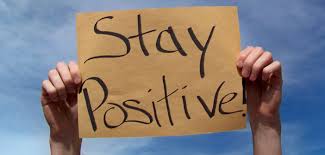Lastt week’s blog article, as well as the next one, are based on my latest eBook, “A Positive Attitude that Gets Results,” soon to be published by Bookboon.
Dr. Edward Creagan in his book, How not to be my patient, refers to research indicating that pessimists have a 19 percent shorter lifespan than optimists. Bernie Siegel in his book, Love, medicine and miracles, mentions research that reported a ten-year survival rate of 75 percent among cancer patients who reacted to the diagnosis with a fighting spirit, compared with a 22 percent survival rate among those who saw their situation as hopeless. A positive attitude could save your life.
A negative attitude can cause stress and lower the body’s immune system. One Harvard study showed that those with the most negative attitudes at 25 suffered the most illnesses in their forties, fifties, and sixties. Another study involved 69 women with breast cancer who were asked three months after their surgery how they viewed their disease and how it affected their lives. 5 years later, 75% of those who had responded positively and with a fighting spirit were still alive compared with less than half the other patients. There is little doubt that attitude can have either a negative or positive impact on your health, productivity, and well-being.
Bad attitudes are frequently the result of bad experiences, such as working in a company that does not support your individual beliefs or values, or for a boss with whom you cannot relate, or working at a job that you dislike. But bad attitudes can change to good attitudes when there is no cognitive dissonance – no conflict between your own beliefs, values, goals, and purpose, and those of the company, your boss, or your coworkers.
Action is the essential ingredient of goal achievement and success. Action relies on the brain. Healthy brains are wired to continuously set, act on, and achieve goals. But just as you manage your business efficiently to make a profit, you must manage your brain efficiently to maximize the use of your time.
Your brain can outperform the greatest computer ever manufactured by man. But just as a man-made computer relies on the users to operate them efficiently, so does your brain rely on you.
Like man-made computers, your brain can pick up viruses. Not a coronavirus, but viruses in the form of negativity, depression, or anger. Your brain can become overloaded and sluggish and even crash. It can have inefficient or outdated programs installed so that it fails to operate at full potential. Or it can be physically abused and mistreated by such things as excessive alcohol, drugs, physical trauma, or lack of sleepor proper nutrition.
You are not your brain. You must believe that to control it. Visualize yourself as the mind – the user – controlling the brain. You can program it to be enthusiastic, happy, positive, focused, and attentive, flexible, persistent, resilient, and so on. Or you can program it to be negative, cynical, and despondent.
Richard Davidson, in his book, the Emotional life of your brain, suggests that every day for a week, do these three exercises.
- Write down one positive characteristic of yourself and one positive characteristic of someone you regularly interact with.
- Express gratitude regularly. Pay attention to times you say, “thank you.”
- Compliment others regularly. Keep an eye out for opportunities to do so, such as a job well done at work.
Davidson claims that you will likely find that positive emotions stick around a little longer and your sense of optimism and possibility swells.
Successful People Read. A Lot.
What do Warren Buffett, Mark Zuckerberg, Elon Musk and Oprah Winfrey have in common? They all read - a LOT! If you want to be successful you need to read. We have over 30 short ebooks designed to get you booked up fast!



Recent Comments